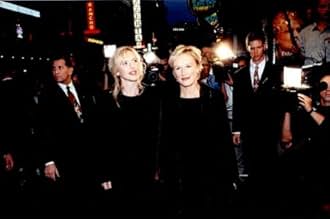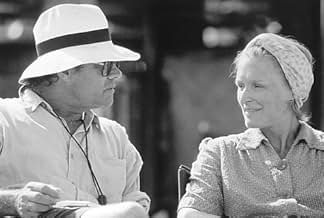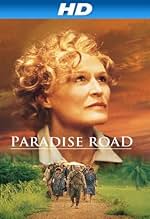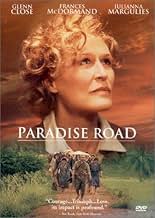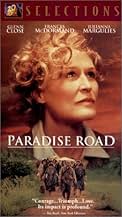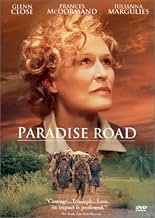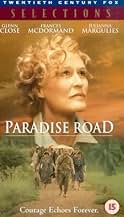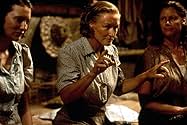IMDb-BEWERTUNG
6,8/10
6184
IHRE BEWERTUNG
Singapur, 1942: Ein japanischer Bombenangriff beendet das Luxusleben der englischen Oberschicht.Singapur, 1942: Ein japanischer Bombenangriff beendet das Luxusleben der englischen Oberschicht.Singapur, 1942: Ein japanischer Bombenangriff beendet das Luxusleben der englischen Oberschicht.
- Auszeichnungen
- 1 Gewinn & 7 Nominierungen insgesamt
Johanna ter Steege
- Sister Wilhelminia
- (as Johanna Ter Steege)
Empfohlene Bewertungen
First class work here. The film follows a group of women captured in Asia by the Japanese, and interned as enemy aliens. It shows the inhuman brutality that the Japanese inflicted on anyone they considered to be of an inferior race. (i.e. not Japanese) (for that matter anyone not samurai) As a coping mechanism, and partially in defiance of their captors, the women form a vocal orchestra, playing the parts of classical music with only their voices. The music soothes the women, those in the orchestra, and those who aren't. The Japanese soldiers even come to enjoy the sound, and the atrocity rate drops a couple of notches.
Stand out performances abound here. In fact I can't really single out any of the cast. They were all good, including the Japanese actors. I had thought from the reviews that the music would be the largest part of the film, with just the backdrop of the prison camp, but it really wasn't. I recommend this film.
Stand out performances abound here. In fact I can't really single out any of the cast. They were all good, including the Japanese actors. I had thought from the reviews that the music would be the largest part of the film, with just the backdrop of the prison camp, but it really wasn't. I recommend this film.
10srne
I stumbled across this movie surfing TV channels late one night. I was drawn right into the plot, and thought it was an incredible story, incredibly well-told. It's a true story, which I previously did not know anything about, but should have. Both the story, itself, and the film, should be much, much better known. It is also one of Glenn Close's best performances. Her performance, and the film, itself, are absoultely gripping! If you like true-life stories that are extremely well-done, such as "We Were Soldiers," then this one is of a similar genre, but with the main characters being women.
This film gripped me from the opening scene in the hotel ballroom and prooved to be a class act right to the end. Director Bruce Beresford's track record includes Driving Miss Daisy, Tender Mercies and Breaker Morant, so Paradise Road came as a special treat, not realising at the time of viewing that he had directed these films. The realistic scenes of violence had a tremendous impact in contrast to some of the wonderful underplaying of the leading actresses, notably Glenn Close and Pauline Collins. The Japanese actors, although unknown to me were chillingly effective. I can only hope for more films of this calibre but alas they are few and far between.
I love this movie because I love the characterization of the women in it. I felt powerfully with the women, felt I knew them, felt complete identification with most of them.
I actually think it's hard to specify the actions and words that will make a character both realistic and sympathetic. Showing mere suffering won't do it. But here, Mr. Beresford has been able to stir such warm feelings (particularly toward the Roberts girl, the Glenn Close and Jennifer Ehle, her Dutch friend, and the Cate Blanchett characters). The romanticism, cheer and background of the Ehle character are particularly well drawn.
This is a far superior movie to 'Platoon', by the way - and a wonderful tribute to those who went through the awful 3.5 year ordeal.
Another thing I quite liked (these days) was to see a movie that did not attempt to make the Caucasians the moral villain relative to the other race depicted.
This is not a movie concerned with p.c. appearances - the Japanese are not shown as somehow merely "different", a difference we "simply cannot understand or judge" because of our different culture. Setting a woman on fire for bargaining for medicine for a sick elderly woman is brutality in any culture - and this movie does not attempt to minimize the moral wrong.
Bravo, Mr. Beresford.
I actually think it's hard to specify the actions and words that will make a character both realistic and sympathetic. Showing mere suffering won't do it. But here, Mr. Beresford has been able to stir such warm feelings (particularly toward the Roberts girl, the Glenn Close and Jennifer Ehle, her Dutch friend, and the Cate Blanchett characters). The romanticism, cheer and background of the Ehle character are particularly well drawn.
This is a far superior movie to 'Platoon', by the way - and a wonderful tribute to those who went through the awful 3.5 year ordeal.
Another thing I quite liked (these days) was to see a movie that did not attempt to make the Caucasians the moral villain relative to the other race depicted.
This is not a movie concerned with p.c. appearances - the Japanese are not shown as somehow merely "different", a difference we "simply cannot understand or judge" because of our different culture. Setting a woman on fire for bargaining for medicine for a sick elderly woman is brutality in any culture - and this movie does not attempt to minimize the moral wrong.
Bravo, Mr. Beresford.
The film is based on actual true events and was inspired by the reminisces of the actual women prisoners of war, many of whom became life-long friends after the ordeal. Fact-based recounting of a group of women who are imprisoned on the island of Sumatra by the Japanese during World War II and used music as a relief to their misery .During WWII a group of women are captured by the Japanese and struggle to survive in brutal POW camp in the Far East . Their confinement is recounted in unsparing and harrowing detail , as Irish/British/Dutch/Jew women find themselves interned for the long duration . As orders from Nipponese Army Administration are strict as ¨Men and women will be imprisoned separately ¨ . ¨To avoid punishments and beatings , the ladies should presume themselves to endeavor , with passive behavior not negative¨. It is an internment camp, where civilians are kept for no other reason than being of the wrong nationality , this happened, for instance, to Japanese civilians in the U.S. Meanwhile, Adrienne suffering a surreal and brutal experience ; she is cruelly attacked ; however , she attempts to lift the spirits of the inmates and the brutalized women. Later on , she creates a choir , but the film refers to the singing prisoner of war women as a vocal orchestra rather than as a choir . This P.O.W film centers women prisoners as its principal cast and subjects with a theme of utilizing music to survive the horrors of war . The final credits state that the vocal orchestra performed over thirty works in the P.O.W camp . It discontinued performing though when about half of the members had died and the remaining survivors were not well enough to participate. The real-life first concert held by the women in the actual P.O.W camp was held on 27 December 1943 and the vocal orchestra performed over thirty works in the P.O.W camp during 1943 and 1944.
¨Paradise road¨(1997) is a good film set in Singapur , directed by Bruce Beresford with an all- woman star-cast as Glenn Close as Adrienne Pargiter , Julianna Margulies as Topsy Merritt , Frances McDormand as a Jew doctor , Cate Blanchett as Susan Macarthy and Jennifer Ehle as Rosemary Leighton-Jones . And special mention to Clyde Kusatsu as cruel , brutal Sergeant Tomiashi, 'The Snake' . Interesting and strong drama , being perfectly adapted by the same director Bruce Beresford , David Giles (story) and Martin Meader (writing credits) , also producers . The film is based on the diaries, reminisces and testimonies of Helen Colijn and Betty Jeffrey as described in their books, "Song of Survival" and "White Coolies". No weakest in the cast and few in the movie , which presents the women's Japanese captors as human and inhuman at the same time with clashing cultures included . Clearly there's much longer plot in this, but director Bruce Beresford concentrates on the passionate acting of Glenn Close . It's a taut psychological drama about physical and emotional survival focusing on the tensions between Glenn Close, soldiers and camp commander well played by Stan Egi as cultured officer. Crammed with emotive moments , the picture has a string of committed performances from Glenn Close Pauline Collins , Jennifer Ehle , among others . Familiar ground is trod in this prisoner-of-war saga , but the thought-provoking story and magnificent acting help sustain interest. Colorful cinematography filmed on location in Marrickville, Sydney, New South Wales, Australia ,Penang ,Malaysia ,Port Douglas, Queensland, Raffles Hotel Singapore . Sensitive musical score , the music in the film was derived from the actual score transcripts used in the P.O.W camps which survived World War II. This superior though overlooked drama , is also laudable for a fairly portrayal of the enemy captors and being rightly directed by Bruce Beresford , this is the second war movie he directed , his first was Breaker Morant.
Other films about women on concentration camps mistreated by Japanese military during WWII are the following : ¨Three came home¨1950 by Jean Negulesco with Claudette Cobert , Patrick Knowles , and Sussue Hayakawa ¨Women on valor¨(1986) by Buzz Kulik with Susan Sarandon , Kristy McNichol and Alberta Watson set in Philippines .
¨Paradise road¨(1997) is a good film set in Singapur , directed by Bruce Beresford with an all- woman star-cast as Glenn Close as Adrienne Pargiter , Julianna Margulies as Topsy Merritt , Frances McDormand as a Jew doctor , Cate Blanchett as Susan Macarthy and Jennifer Ehle as Rosemary Leighton-Jones . And special mention to Clyde Kusatsu as cruel , brutal Sergeant Tomiashi, 'The Snake' . Interesting and strong drama , being perfectly adapted by the same director Bruce Beresford , David Giles (story) and Martin Meader (writing credits) , also producers . The film is based on the diaries, reminisces and testimonies of Helen Colijn and Betty Jeffrey as described in their books, "Song of Survival" and "White Coolies". No weakest in the cast and few in the movie , which presents the women's Japanese captors as human and inhuman at the same time with clashing cultures included . Clearly there's much longer plot in this, but director Bruce Beresford concentrates on the passionate acting of Glenn Close . It's a taut psychological drama about physical and emotional survival focusing on the tensions between Glenn Close, soldiers and camp commander well played by Stan Egi as cultured officer. Crammed with emotive moments , the picture has a string of committed performances from Glenn Close Pauline Collins , Jennifer Ehle , among others . Familiar ground is trod in this prisoner-of-war saga , but the thought-provoking story and magnificent acting help sustain interest. Colorful cinematography filmed on location in Marrickville, Sydney, New South Wales, Australia ,Penang ,Malaysia ,Port Douglas, Queensland, Raffles Hotel Singapore . Sensitive musical score , the music in the film was derived from the actual score transcripts used in the P.O.W camps which survived World War II. This superior though overlooked drama , is also laudable for a fairly portrayal of the enemy captors and being rightly directed by Bruce Beresford , this is the second war movie he directed , his first was Breaker Morant.
Other films about women on concentration camps mistreated by Japanese military during WWII are the following : ¨Three came home¨1950 by Jean Negulesco with Claudette Cobert , Patrick Knowles , and Sussue Hayakawa ¨Women on valor¨(1986) by Buzz Kulik with Susan Sarandon , Kristy McNichol and Alberta Watson set in Philippines .
Wusstest du schon
- WissenswertesThe music in the film was derived from the actual score transcripts used in the P.O.W camps which survived World War II.
- PatzerThe women of the choir did the singing while sitting down because of having to work in the extreme heat during the day left them exhausted.
- Zitate
Adrienne Pargiter: You don't hate them do you?
Margaret Drummond: No.
Adrienne Pargiter: Why not?
Margaret Drummond: I've tried, but I can't bring myself to hate people. The worse they behave, the sorrier I feel for them.
- SoundtracksSymphony No. 9 in E minor Op. 95 'From the New World' II. Largo
Written by Antonín Dvorák (as Antonin Dvorak)
Top-Auswahl
Melde dich zum Bewerten an und greife auf die Watchlist für personalisierte Empfehlungen zu.
- How long is Paradise Road?Powered by Alexa
Details
- Erscheinungsdatum
- Herkunftsländer
- Sprachen
- Auch bekannt als
- Paradise Road
- Drehorte
- Produktionsfirmen
- Weitere beteiligte Unternehmen bei IMDbPro anzeigen
Box Office
- Budget
- 16.000.000 $ (geschätzt)
- Bruttoertrag in den USA und Kanada
- 2.007.100 $
- Eröffnungswochenende in den USA und in Kanada
- 62.518 $
- 13. Apr. 1997
- Weltweiter Bruttoertrag
- 2.007.100 $
- Laufzeit
- 2 Std. 2 Min.(122 min)
- Farbe
- Sound-Mix
- Seitenverhältnis
- 2.35 : 1
Zu dieser Seite beitragen
Bearbeitung vorschlagen oder fehlenden Inhalt hinzufügen


